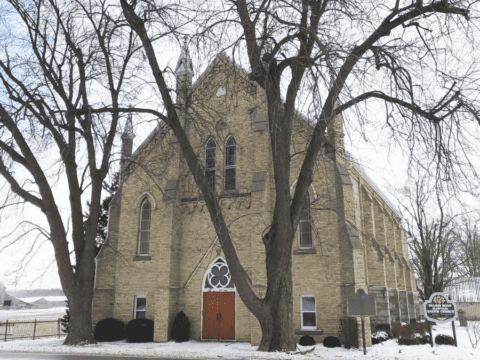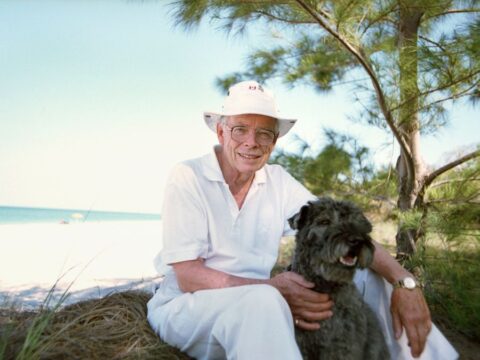This sermon was delivered on July 22, 2018 in Oshawa, Ont.
The beginning of my call to ministry happened when I travelled to Palestine with the church nearly 10 years ago. The partners we visited, the people we met showed me how crucial hope is to life. They do not have the luxury of despair. To live in that land, surrounded by walls and checkpoints, while holding onto the keys to the homes before 1948, is to hope.
You may unsubscribe from any of our newsletters at any time.
“Send them away.” “No, you do it, you feed them.”
In the World Council of Churches, where folks gather from all over God’s broken and beautiful world, I witness that life-giving hope. From the Pacific where people are sounding the alarm of rising waters and loss of sea life, to the Middle East where Christians are being persecuted for what they believe, to Europe where migrants are arriving seeking refuge, people of faith dare to hope for God’s coming kingdom. A faith that risks and a hope that dares a new world.
“Send them away.” “No, you do it, you feed them.”
30 years ago, the year I was born, our United Church of Canada decided to ordain and commission openly gay and lesbian ministers. We began a daring pilgrimage that continues. At a time when the scientific world and popular culture were largely homophobic, we affirmed that all baptized people are beloved children and servants of God, not regardless of sexual orientation, but celebrating the beauty of our diversity, welcoming people to offer their gifts, our gifts.
.@AFP reports that #Spanish maritime #rescue services have saved 211 #migrants from 21 different boats in the Straits of #Gibraltar. #icmp #refugees @UNmigration https://t.co/ARjsAkuFVZ pic.twitter.com/jnz7xq5sr5
— ICMP (@TheICMP) July 30, 2018
“Send them away.” “No, you do it, you feed them.”
A pilgrimage of faith, a pilgrimage that risks hope, a pilgrimage that seeks justice and peace—that is what Jesus called the first disciples to join. Jesus dared to send them out with all that they needed: authority to heal, sandals, a staff, and someone to accompany them. At the very beginning of his ministry, Jesus sent out disciples, knowing God’s mission in the world takes time and takes community. He told them to accept hospitality wherever they found it, to be fed by their hosts, and in return, to share the good news of God’s kingdom. Evangelism was not about maintenance or survival; their pilgrimage was about taking risks for the sake of the gospel.
“Send them away.” “No, you do it, you feed them.”
After being away on pilgrimage, the disciples came home to Jesus to share stories, to rest, to be apart with their teacher. They were excited by what God had done through them and they were tired. Jesus was too. After receiving hospitality along their travels, they just wanted to be led by still waters.
Then the disciples saw the crowds and thought, “Oh no, not now!”
Yet, Mark tells us, Jesus had compassion for the crowd of thousands; something in his gut churned, and he knew that he was needed for the world, and not only for his small group of disciples. However, his friends weren’t too keen. They could only imagine one way this could work out. They had neither food nor money enough to provide. “Send them away,” they told Jesus. Jesus didn’t let them off the hook but gave them yet another mission: “No, you do it, you feed them.”
This is a pilgrimage that takes risks in faith and dares to hope with compassion in God’s world.
With two fish and five loaves, Jesus, the good shepherd, sits down on the green grass, and all ate and all were filled. As in the time of Moses, when manna came from heaven, as in the time when Jesus and the disciples sat around a table, as in the promised time where all will feast at God’s banquet, there will not just be enough. There will be an abundance. Provisions are given, thanks are offered, bread is shared, and all are fed.
This is a pilgrimage that takes risks in faith and dares to hope with compassion in God’s world.
“I worry that, in the midst of changing structures and seeking to do church ‘differently,’ we forget that we are not alone.”
As proud as I am to be part of our United Church, as honoured and privileged as I feel to share good news with you today as we gather on our pilgrimage, I worry.
I worry that we congratulate ourselves for being more committed to justice, more committed to valuing all peoples and encouraging intercultural communities, than our denominational neighbours down the road.
I worry that we are quick to say, “Oh yes, Jesus, we’ll feed them,” but then don’t accept the gifts the “hungry,” those on the margins, bring to the feast.
I worry that we say we seek right relations with Indigenous peoples, yet try to water down our responsibilities.
I worry that we use people to show how diverse we are, but then ignore their struggles of daily service.
I worry that we keep a tight grip on “our resources” without realizing or celebrating that all we have was first shared by God.
I worry that we would tell Jesus to “send them away” because we feel we are not enough.
And I worry that, in the midst of changing structures and seeking to do church “differently,” we forget that we are not alone. We forget that we have gifts to offer, but we don’t have everything and we need companions on this pilgrimage. We forget that structures are not our mission but are here to enable our mission for this time and place. We forget that we are the ones to feed and share with each other. We forget that we are called to take risks in faith and dare to hope with compassion in God’s world.
Intercultural Observer Paul Douglas Walfall calls on us to recognize that racism exists in the church, in our church. #UCCan #GC43 pic.twitter.com/f9OXTk3JaP
— United Church Canada (@UnitedChurchCda) July 27, 2018
And yet, my worries, my struggles, dissipate when I am invited into the upper room with Jesus and the disciples.
In my favourite gospel, John, Jesus takes off his garment, wraps a towel at his waist, pours water into a basin, and washes his dear disciples’ feet. Jesus shows us how to act with humility and vulnerability, in service and love.
My worries dissipate when Jesus hosts his dear disciples at table, when he blesses, breaks, and gives bread; blesses, pours, and gives wine, with humility and vulnerability, in service and love.
The church, we dear disciples in the world, does not have the luxury of despair—our hope, throughout time and today, remains steadfast in Jesus Christ, our servant shepherd.
Along this pilgrimage, where we are called to take risks in faith and dare to hope, we are washed, fed, and renewed with the life of Jesus by the grace of God. Along this pilgrimage, as we encounter others, Jesus calls to us: “You feed them, feed them with compassion and hope.”













